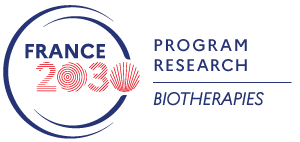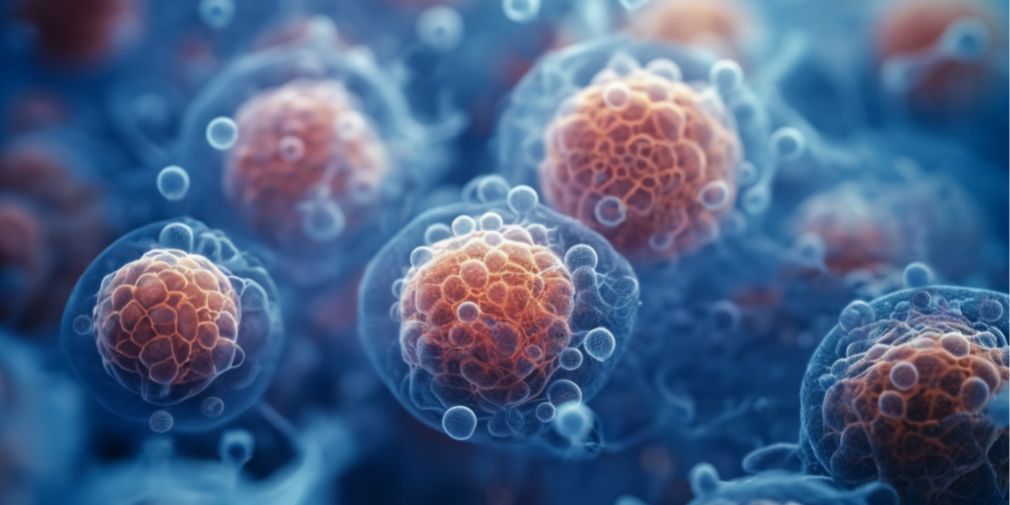Development of biotherapies based on the local delivery of therapeutic RNAs by hybrid functionalized extracellular vesicles (EVs) for musculoskeletal regeneration
Florence GAZEAU – UMR 7057
CNRS – Université Paris Cité
Matière et Systèmes Complexes (MSC)
Extracellular vesicles
Therapeutic RNAs
Bioproduction
Skeleton regeneration
- Budget : 3,6 M€
- Duration : 4 years (2023 – 2027)
Our challenge : Make extracellular vesicles the next generation of RNA nanovectors with enhanced efficacy and safety for regenerative therapy
Therapeutic RNAs, including microRNAs (miRNAs, small non-coding, regulatory but unstable nucleosides) and messenger RNAs (mRNAs), show promise for tissue regeneration, but their use faces major problems for regenerative medicine, such as control of the immune response. The CARN project proposes the development of biomedicines using extracellular vesicles (EVs) as biologically active therapeutic RNA delivery systems for skeletal regeneration. EVs isolated from mesenchymal stromal cells (MSCs) reproduce the therapeutic effect of their parental cells and are of real therapeutic interest in regenerative medicine. Naturally circulating in the body to ensure intercellular communication, they contain proteins, lipids but also nucleic acids, in particular miRNAs which are responsible for their biological effects. EVs are also being developed as targeted delivery systems due to
- their ability to deliver therapeutic “cargo” in a tissue-specific manner ;
- their exceptional ability to escape from intracellular endosomes and to deliver RNA into the cytosol where it will be active.
Currently (see Nobel Prize in Medicine 2023), synthetic lipid vesicles (for example, liposomes or lipid nanoparticles) are used to transport RNA (BioNTech and Moderna vaccines against Covid-19). However, if these synthetic nanoformulations are suitable for a vaccine strategy with regard to their ability to induce an immune response, they must be modified for other types of therapeutic strategies, in particular for regenerative medicine where inflammation must be finely controlled. In this context, their association with stem cell EVs, through a hybrid formulation, is a promising strategy to combine the immuno-regulatory and regenerative effects of EVs and more efficient RNA delivery. These hybrid EVs can also be functionalized on the surface by recognition elements with the aim of specifically targeting the cells of degenerated tissues (cartilage and intervertebral discs).
Thanks to the complementary and multidisciplinary expertise of the CARN consortium, we will offer different innovative, responsible and large-scale methods, of (bio)production of therapeutic RNA, bioproduction of extracellular vesicles from stem cells, and their hybridization to optimize the next generation of RNA nanovectors for regenerative purposes. Different targeting motifs will be studied (CD44 ligand, short Link-N peptides, affinity peptide for cartilage cells).
We propose that the combination, in hybrid EVs, of the targeting and tissue delivery potential of natural EVs and the high RNA loading of lipid nanoparticles can jointly provide added value for therapeutic RNA delivery. In the CARN project, microRNAs targeting various pathological processes (inflammation, apoptosis, senescence) and mRNAs coding for biological factors (transcription factors, growth factors, anti-geronic factors) involved in skeletal regeneration and in immunosuppressive effects mesenchymal stromal cells will be formulated and encapsulated in innovative functionalized hybrid EVs.
By offering functionalized hybrid EVs decorated with recognition elements and containing therapeutic RNAs, CARN will enable these hybrid EVs to open new therapeutic windows in the treatment of skeletal diseases for better patient care, while contributing to French innovation and sovereignty in bioproduction of innovative therapies.
| Coordinating partner : Florence GAZEAU – UMR 7057 CNRS – Paris Cité University Complex Materials and Systems Laboratory (MSC) |
|||||||
| Jérôme GUICHEUX – UMRS 1229 Inserm – Nantes University – Oniris Regenerative Medicine and Skeleton (RMeS) |
|||||||
| Chantal PICHON – US55 ART-ARNm Inserm Orléans University |
|||||||
| Elias FATTAL – UMR 8612 CNRS Galien Institute Paris-Saclay (IGPS) |
|||||||
| Marie MORILLE – UMR 5253 CNRS – ENSCM Charles Gerhardt Montpellier Institute (ICGM) |
|||||||
| Danièle NOËL – UMR 1183 Inserm Institute for Regenerative Medicine and Biotherapy (IRMB) |


